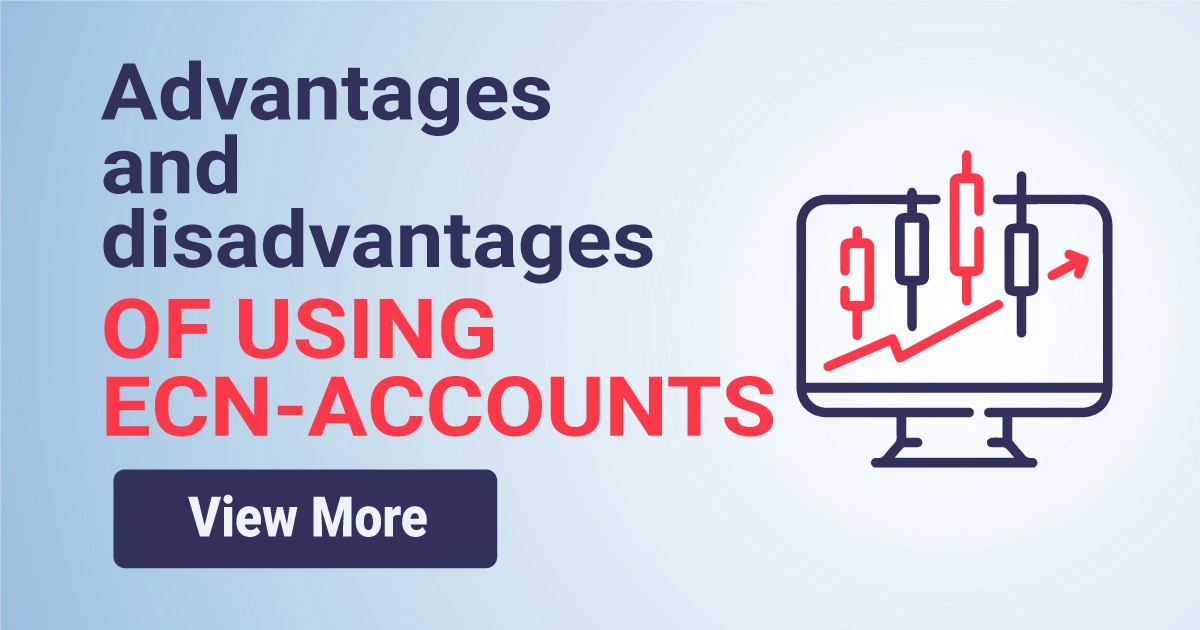Advantages and disadvantages of using ECN-accounts
ECN – Electronic Communications Network
ECN provides a venue for trading, where all participants (banks, market participants, and traders) trade against each other by offering prices within the system.
ECN-broker
It is a type of brokerage company that provides its customers with direct access to other participants of the Foreign Exchange market. The ECN brokers do not restrict scalping, do not trade against their customers, and do not charge spread (although there still exists a low spread dictated by the market prices), although they charge a fixed fee for each order.
ECN trading has advantages in comparison to the trading by means of brokers, which are market-makers, since with ECN-brokers the trader’s orders are not executed with a broker as counterparty, but have their own counterparty or another customer of an ECN broker, or in the form of liquidity, provided by the ECN broker’s partner.
STP (STP – Straight Through Processing
It is from the beginning to the end automated processing of trades and (or) payment orders, including an automated creation, adaption of regulations, clearing, and calculations. The systems of this type are often applied by the large ECN brokers.
So why are ECN-brokers better?
The answer hides in the liquidity providers by market-makers and their relation with the international interbank market. They are not quite easy to determine, as these relations can be expressed in many forms. However, the following explanation can be applied to the majority of retail brokers (or market-makers).
As many of you may already know, market-makers are the counterparties to all of your trades. Trading on the stock exchange, trader A sells, another participant B buys, and the stock exchange broker receives a commission for facilitating the trade. With a market-maker (a retail broker, let’s call it MM), when trader A buys, MM sells, and when trader B sells, MM buys. MM can also take the A’s trade and cover it with its liquidity provider, or it can put it to the pool and open a position along with its liquidity provider, or it can also leave it knowing that A will still lose. In any case, market-makers have one or often two steps between the A trader and banks’ community, hedge-funds, or other brokers, which could cover the A’s trade in an environment similar to ECN.
These two steps are the place, where problems emerge for market-maker A during high-volatility trading, for example, once the news is released. The A customer’s dealing center might have offered him “the fixed spreads”, “the guaranteed orders’ execution” and “absence of slippage”. Or they simply did not slip him and extended spreads in the past, because everything worked out in their liquidity pools and they wanted their customer A to be happy.
Then suddenly everything changes. More and more customers of our market-maker MM start trading on the news. At the same time, they are becoming successful, because the market’s reaction was predictive and they know the strategy very well. Now MM has problems – their business model does not work and they lose big funds during the important news release. Why? This all happens because of steps 1 and 2 between trader A and a big market. The point is that our old-good MM buys from A and hundreds of its customers when no one in the Forex community would do so. And as you may have already guessed, nobody will sell to MM, so they could cover their customers’ positions.
And what is MM doing?
If you are a Forex trader, you already know the answer. It extends the spreads, introduces slippage, or simply switches off during the important economic news release.
ECN brokers will surely not save you from all the inconveniences and difficulties that have to do with the Forex market. As the ECN type brokers have direct access to ECN nets, they are bound by many rules and conditions, functioning in these particular nets which in one or another way will influence your trading. For example, not a single ECN broker can fully guarantee that your stop-losses are to be executed at the set price. Besides, the brokers’ system of the ECN type does not allow to set up stop-loss immediately, at the trade set up. In some cases, the “real” fluctuating spread may be higher than the stable one, made up artificially. In addition, ECN brokers often do not work with accounts of less than 1000 dollars.
So, what broker should one choose?
The answer is up to you. Now we have a better understanding of the structure and advantages of every broker’s type. Generally, more experienced and active Forex traders will be more satisfied with the ECN type broker. The transparency of trading through the interbank by means of ECN or NDD (no dealing desk) is a big advantage.
At the same time, a beginner is likely to feel better with a qualitative and reliable market-maker because of its simplicity.
From time to time, we will release articles on the setup and operating principles of the modern brokers. We have quite a few things to tell you about it.
Have a successful trading!




















Pliss ingt tu grp